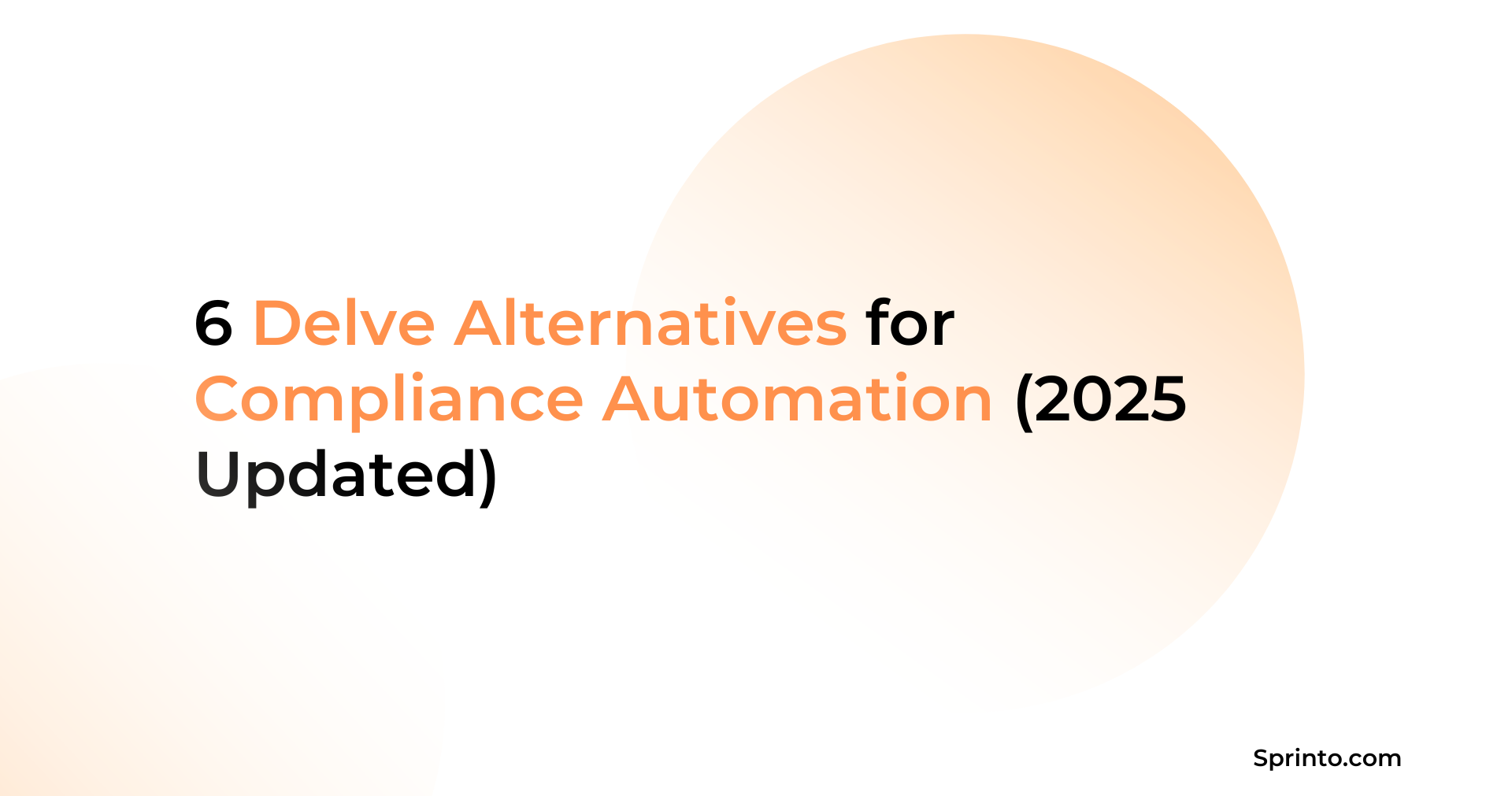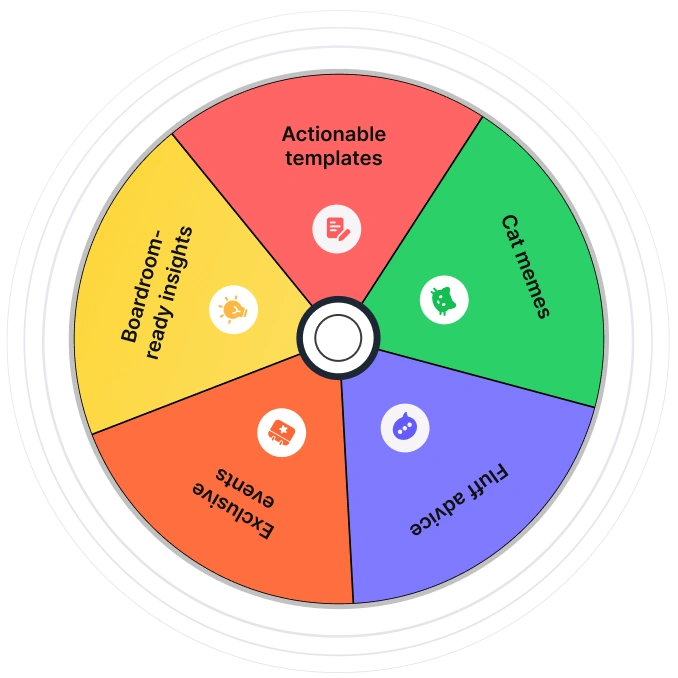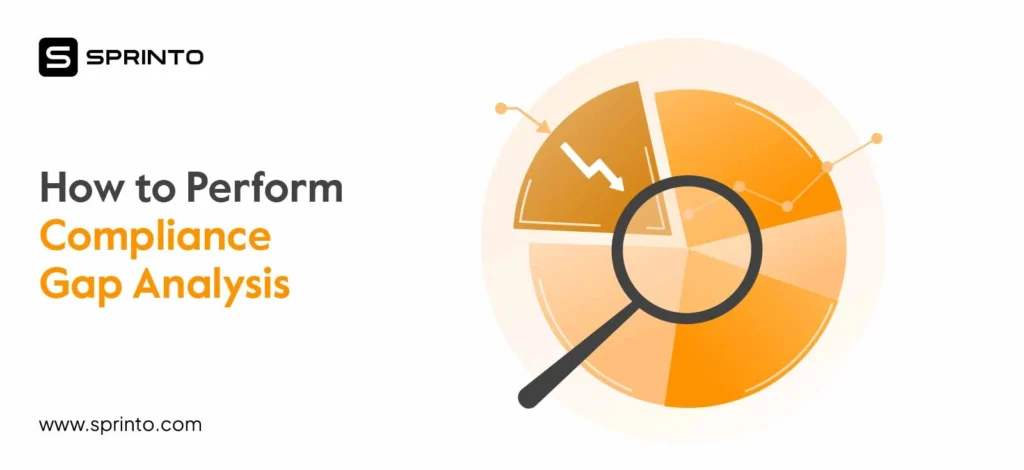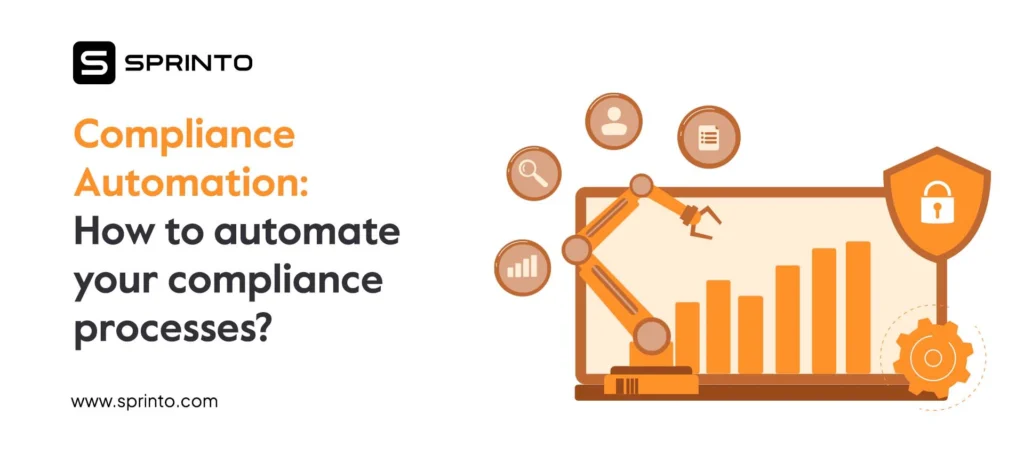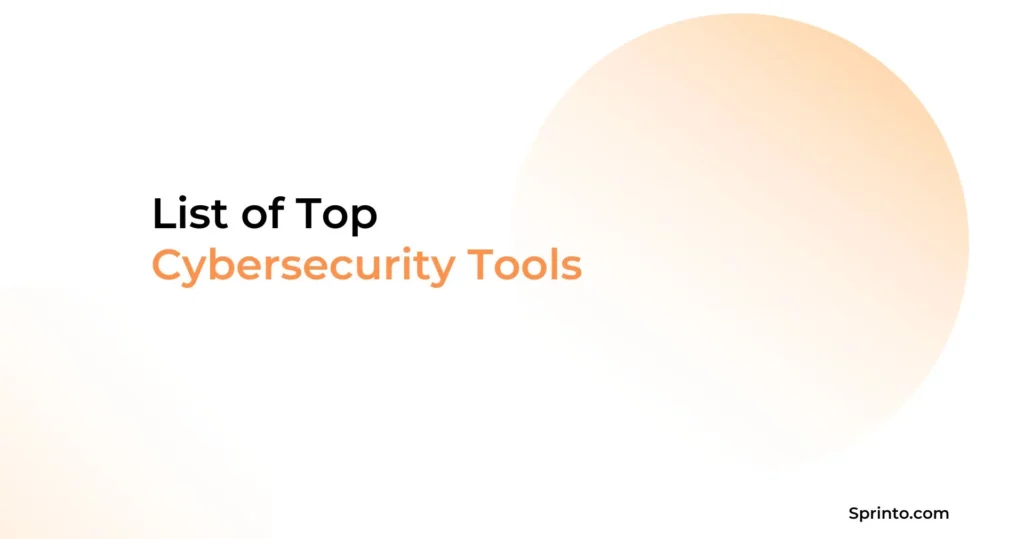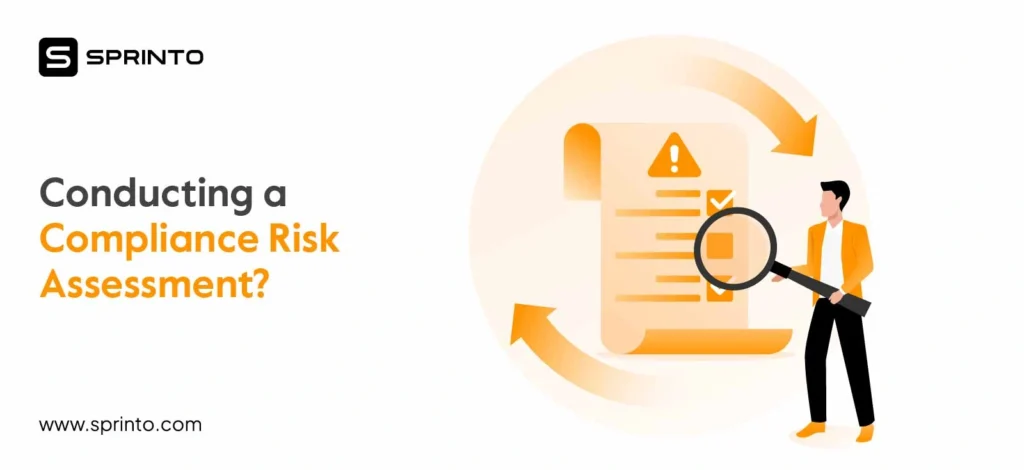TL; DR
| In this guide, we compare six leading Delve alternatives, focusing on what matters most when you’re scaling compliance: multi-framework coverage, evidence automation and continuous monitoring, integration breadth, workflow/reporting flexibility, support and onboarding, and cost/deployment trade-offs (including open-source vs. managed platforms). Top 6 Delve alternatives in 2026: 1. Sprinto 2. Drata 3. Vanta 4. Hyperproof 5. Scrut Automation 6. Probo |
Delve helps teams bring compliance tasks into one place and automate parts of audit preparation. Its integrations and multi‑framework support make it a capable option for a range of businesses.
Still, even a strong platform can slow progress if it doesn’t match how your team works or where your business is headed. Choosing the wrong tool at a critical stage of growth can mean more manual work, slower audits, and higher costs.
In this article, we’ll walk you through six alternatives to Delve so you can choose the compliance platform that best fits your frameworks, processes, and growth plans. Here is a quick overview of the top alternatives to consider in 2025.
What is Delve?
Delve is a software for managing compliance work in one place. It holds policies, risk records, and audit material, and connects to the systems a company already runs.
Data from those systems is pulled in and linked to the rules or standards the business must follow. From there, teams can check which controls are in place, add proof where needed, and keep everything ready for review. It takes the sprawl of files, emails, and checklists and puts them into a single, working record.
Why are companies looking for Delve alternatives?
Many teams find that their compliance programs outpace Delve’s capabilities. As the number of frameworks grows, they may look for more automation or broader integration options. Pricing also plays a role; with a quote‑based model, costs can increase as headcount or frameworks expand.
In recent years, other platforms have added risk management, vendor assessments, and more flexible reporting to their core compliance features. For companies working across several frameworks or facing frequent regulatory changes, those additions can be a deciding factor in moving to another system.
Top 6 Delve alternatives for 2025 and beyond
Choosing the right compliance platform can shape how smoothly your team meets security and regulatory goals. The best options combine automation, strong integrations, and the flexibility to grow with your business. Each platform in this list addresses compliance in its way, offering different strengths to consider.
Here are six Delve alternatives worth a closer look in 2025.
1. Sprinto
Sprinto is built for companies that need to meet several compliance frameworks at once but prefer not to expand internal compliance teams. The platform ties directly into cloud services, identity providers, HR platforms, and developer tools, pulling live data to track whether controls remain in place.
It supports SOC 2, ISO 27001, PCI DSS, HIPAA, GDPR, FedRAMP, and more. Alongside continuous evidence collection, Sprinto offers vulnerability scanning, mobile device checks, and the ability to segment operations into separate “zones” for different subsidiaries or product lines. With more than 200 integrations, most routine evidence work can be handled automatically.
Pros & cons
| Pros | Cons |
| Handles multiple frameworks in one system with over 200 direct integrations | Lower‑tier plans have basic reporting and dashboard capabilities |
| Includes mobile device compliance and built‑in vulnerability scoring | Pricing is usage-based, which can make early budgeting less precise |
| Access to specialists who guide teams through the compliance process | |
| 24/7 white‑glove customer support | |
| Connects seamlessly with 200+ cloud applications and services |
Why choose Sprinto
Sprinto is a practical fit for tech companies that are scaling quickly and have looming audit or certification deadlines. The automation reduces the hours spent assembling audit material, while its “zones” feature helps keep different product lines or regions separate without duplicating work.
Teams without a dedicated compliance lead can lean on the platform’s support to move from first setup to audit readiness in a shorter window.
“We’ve always looked at Sprinto as a way to take the weight off already stretched teams. Compliance can feel like an endless checklist, but we aim to turn it into something you can stay on top of without it taking over your week. If we’ve made it easier for a team to breathe and focus on their actual product, then we’ve done our job.” — Rajiv, ISO Lead Auditor, Sprinto
2. Drata
Drata is a compliance platform that automates evidence collection and tracks whether required controls exist across frameworks such as SOC 2, ISO 27001, HIPAA, PCI DSS, and GDPR. It links with widely used cloud providers, identity systems, and development tools to pull configuration data into a single view.
The platform may appeal to organizations that want to monitor several frameworks in one place and reduce the need for manual record gathering. Teams that operate in cloud‑heavy environments might find value in its ability to align system settings with framework requirements on an ongoing basis.
Drata could reduce the work needed to prepare for external reviews or audits by keeping compliance information current. However, its fit depends on an organization’s scope and internal processes.
Pros & cons
| Pros | Cons |
| Supports multiple compliance frameworks | Pricing can rise with additional frameworks or team size |
| Automates the collection of evidence from connected systems | Some newer capabilities have limited depth |
| Includes guidance from experienced compliance professionals | Fewer customization options in entry-level plans |
3. Vanta
Vanta is a compliance platform connecting with many cloud services, identity systems, and development tools. It performs automated checks on connected systems to confirm whether controls are in place and aligned with selected frameworks. The results are presented in a workspace with related policies and supporting records.
The platform may be used by organizations working under several frameworks that want to keep compliance data in one location. It might also suit teams that prefer automated testing at set intervals rather than manual spot checks. How well it fits often depends on the need for customization and the budget available for scaling.
Pros & cons
| Pros | Cons |
| Supports a wide range of frameworks | Limited flexibility for tailoring workflows |
| A large number of integrations with common tools | Pricing may rise as usage expands |
| Regular automated checks on control status | Some functions are basic compared to specialized products |
4. Hyperproof
Many smaller and mid‑sized companies use Hyperproof to handle security and privacy frameworks such as SOC 2, ISO 27001, HIPAA, and GDPR. It links into cloud services, identity systems, and code repositories to pull configuration details into one workspace. Tests run regularly to check if controls remain active, and results can be stored alongside policies and related documentation.
Its broad integration range can suit teams that already depend on various SaaS tools, although the workflow options are more fixed than some organizations might want. Costs are set by tier and can climb as more frameworks or users are added, which may affect longer‑term budgeting. For highly customized compliance approaches, its structure might feel less adaptable.
| Pros | Cons |
| Connects with a variety of external systems | Limited flexibility in workflows |
| Covers multiple compliance standards | Pricing can increase with scale |
| Performs recurring automated checks | Less adaptable for complex, custom programs |
5. Scrut Automation
Scrut Automation supports a wide range of compliance frameworks and includes tools for organizing evidence, assigning tasks, and tracking progress. Its “Trust Vault” feature allows security documents and certifications to be controlled-accessible to external parties.
The platform also includes a library of policies prepared by compliance specialists that can be tailored to match an organization’s operations.
Some teams may find their AI‑driven guidance valuable for identifying and addressing gaps, though others might prefer more manual control. Pricing details are not public, and occasional software issues have been reported, which may be a factor when planning long‑term use.
Pros & cons
| Pros | Cons |
| Provides a structured space for sharing compliance materials | No published pricing information |
| Offers ready‑to‑use policy templates | Some users report software reliability issues |
| Includes AI‑based insights for addressing gaps | May suit structured workflows more than highly flexible ones |
6. Probo
Probo is an open‑source compliance platform that runs on infrastructure you control. It comes with policy templates, checklists, and evidence‑gathering tools for frameworks such as SOC 2, ISO 27001, and GDPR.
There are also built-in options for logging vendor reviews and keeping track of audit preparation. Updates and new features come from a community of contributors rather than a single vendor.
That flexibility can be helpful for teams that like to shape their systems, but results vary depending on how actively the project is developed. Running Probo usually requires someone in-house to handle installation, updates, and fixes. The software is free; hosted versions and paid support exist for teams that want to offload some upkeep.
Pros & cons
| Pros | Cons |
| No licence fees for the base platform | Needs internal technical capability |
| Community‑led development | Paid support or hosting may be required for some teams |
| Full control over how and where it is deployed | Feature progress depends on community activity |
How to pick the right Delve alternative that works for you
Switching compliance platforms reshapes how your team works daily, not just how audits are handled. A clear plan for choosing the next one helps avoid another switch later. Here are some points worth weighing before you decide:
- Confirm the platform supports both the standards you follow now and the ones you expect to add
- Check that integrations with your essential systems are stable and actively maintained
- Choose a tool with workflows that match how your team operates or can adapt when needed
- Ask how costs change as your scope grows to avoid budget shocks
- Review reports and dashboards to see if they make sense to people outside the compliance team
- Make sure onboarding and support align with your team’s experience level
- Select software that can take on more frameworks, controls, and users as your program expands
What makes Sprinto the #1 choice
Compliance platforms often fall into the same traps. They look automated on the surface, yet still demand hours of manual evidence gathering. They track frameworks in isolation, forcing teams to repeat work and making it hard to see the full picture in one place. Pricing can feel unpredictable, and adding new frameworks often means rebuilding large parts of the program.
Sprinto is designed to solve those problems from the ground up. Evidence is collected continuously from the systems you already use, with controls mapped across frameworks so one update applies everywhere it should. The dashboard shows precisely where you stand, whether you manage one standard or several. Frameworks can be added in sequence without losing past work, and costs scale in a way that teams can plan for.
Onboarding is handled by specialists who understand the pressure of audit timelines and the reality of lean teams. They help you reach compliance faster, but more importantly, they set you up for steady, ongoing alignment — no scramble before each audit, no starting over.
For organizations that want compliance to support growth instead of slowing it down, Sprinto offers a fast implementation platform, easy to expand, and built to stay in step with your business.
Frequently asked questions
The best fit often depends on how many frameworks you manage, how fast you need to be audit‑ready, and how much you want to be automated. Sprinto is a strong choice for teams that wish deep integrations, ongoing control and monitoring, and a setup process guided by compliance specialists.
Delve offers a single space to manage frameworks, store evidence, and connect with other systems. It can help organize audits, though some teams prefer more automation, richer reporting, or greater workflow flexibility.
Migrating involves moving frameworks, controls, and evidence into the new system and reconnecting integrations. Sprinto supports this with a structured import process and guidance that helps teams quickly get back to compliance operations.
Payal Wadhwa
Payal is your friendly neighborhood compliance whiz who is also ISC2 certified! She turns perplexing compliance lingo into actionable advice about keeping your digital business safe and savvy. When she isn’t saving virtual worlds, she’s penning down poetic musings or lighting up local open mics. Cyber savvy by day, poet by night!
Explore more
research & insights curated to help you earn a seat at the table.



